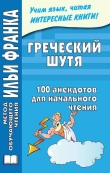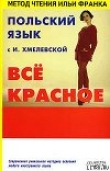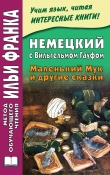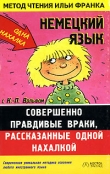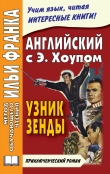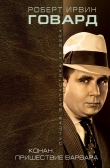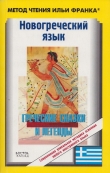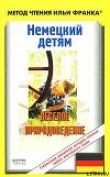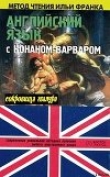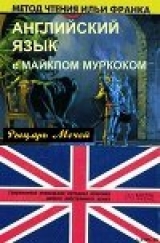
Текст книги "Английский язык с М. Муркоком"
Автор книги: Майкл Джон Муркок
Соавторы: Илья Франк,Андрей Еремин
Жанры:
Языкознание
,сообщить о нарушении
Текущая страница: 12 (всего у книги 36 страниц)
`Corum! Corum! You go wrong way (ты идешь не туда: «в неправильном направлении»).
`I go back to where I shall find my enemies (я возвращаюсь /туда/, где смогу найти своих врагов), Corum said. `That is not the wrong way (это верная дорога: «не неправильная дорога»).
`My master say, me take you that way (мой хозяин говорит, /чтобы/ я отвел тебя туда; that way – туда; this way – сюда; way – путь, дорога; направление) … Serwde pointed towards the West (Сервд указал на запад).
`There is only sea that way, Serwde (там только море, Сервд). It is the far tip of Bro-an-Vadhagh (это дальняя = западная оконечность Бро-ан-Вадага; tip – кончик; верхушка; наконечник).
saluted [səˈlu:tɪd] wrong [rɔŋ] enemies [ˈenəmɪz]
`Farewell, Brown Man of Laahr. I thank you for saving me. And I thank your master. Now I go.
Corum saluted Serwde and began to walk up the valley, heading towards the East. Serwde came shambling after him.
`Corum! Corum! You go wrong way.
`I go back to where I shall find my enemies, Corum said. `That is not the wrong way.
`My master say, me take you that way… Serwde pointed towards the West.
`There is only sea that way, Serwde. It is the far tip of Bro-an-Vadhagh.
`My master say that way, insisted Serwde (настаивал Сервд).
`I am grateful for your concern, Serwde (я благодарен за твою заботу, Сервд). But I go this way – to find the Mabden and take my revenge (но я пойду сюда – чтобы найти мабденов и отомстить).
`You go that way (ты пойдешь туда). Serwde pointed again and put his paw on Corum's arm (Сервд снова указал /на запад/ и положил лапу на предплечье Корума; arm – рука /от кисти до плеча/). `That way.
Corum shook the paw off (Корум освободился от лапы; to shake off – стряхивать /пыль/; избавляться).
`No. This way. He continued to walk up the valley towards the West (он продолжил идти из лощины на запад).
Then, suddenly, something struck him on the back of the head (затем вдруг что-то ударило его по затылку; to strike). He reeled and turned to see what had struck him (он пошатнулся и обернулся, чтобы посмотреть, что ударило его; to reel – кружить/ся/; покачнуться, пошатнуться). Serwde stood there, holding another stone ready (Сервд стоял там = недалеко, держа еще один камень наготове).
grateful [ˈɡreɪtful] paw [pɔ:] holding [ˈhəuldɪŋ]
`My master say that way, insisted Serwde.
`I am grateful for your concern, Serwde. But I go this way – to find the Mabden and take my revenge.
`You go that way. Serwde pointed again and put his paw on Corum's arm. `That way.
Corum shook the paw off.
`No. This way. He continued to walk up the valley towards the West.
Then, suddenly, something struck him on the back of the head. He reeled and turned to see what had struck him. Serwde stood there, holding another stone ready.
Corum cursed and was about to berate Serwde (Корум выругался и собирался выбранить Сервда; to berate – бранить, ругать) when his senses left him once again and he fell full-length on the grass (когда чувства снова покинули его, и он растянулся во весь рост на траве; to fall full-length – растянуться во всю длину, упасть плашмя).
He was awakened by the sound of the sea (его разбудил звук моря).
At first he could not decide what was happening to him (сначала он не мог понять, что происходит с ним; to decide – решать/ся/, делать выбор) and then he realised that he was being carried, face down, over Serwde's shoulder (потом он осознал/понял, что его несет Сервд, лицом вниз, /перекинув/ через плечо). He struggled, but the Brown Man of Laahr was much stronger than he appeared to be (он боролся, но Мохнатый Человек из Лаара был намного сильнее, чем казался). He held Corum firmly (он держал Корума крепко).
Corum looked to one side (Корум посмотрел в одну сторону). There was the sea, green and foaming against the shingle (там было море, зеленое, разбивавшееся в пену о берег; to foam – пениться; взмыливаться; shingle – галька, голыши; берег, покрытый галькой). He looked to the other side, his blind side (он посмотрел в другую, свою слепую сторону = направо), and managed to strain his head round to see what was there (и сумел вывернуть голову, чтобы увидеть, что находится там; to strain – натягивать/ся/, растягивать/ся/; напрягаться).
berate [bɪˈreɪt] length [leŋƟ] shoulder [ˈʃəuldə] shingle [ˈʃɪŋɡ (ə) l]
Corum cursed and was about to berate Serwde when his senses left him once again and he fell full-length on the grass.
He was awakened by the sound of the sea.
At first he could not decide what was happening to him and then he realised that he was being carried, face down, over Serwde's shoulder. He struggled, but the Brown Man of Laahr was much stronger than he appeared to be. He held Corum firmly.
Corum looked to one side. There was the sea, green and foaming against the shingle. He looked to the other side, his blind side, and managed to strain his head round to see what was there.
It was the sea again (там тоже было море). He was being carried along a narrow piece of land that rose out of the water (/Сервд/ нес его по узкому участку земли, который выступал из воды; to rise – подниматься, возвышаться; увеличиваться). Eventually, though his head was bumping up and down as Serwde jogged along (в конце концов, несмотря на то, что его голова поднималась и опускалась, когда Сервд шел, подпрыгивая; to bump – ударять/ся/; толкать; to jog – идти, ехать подскакивая; трястись), he saw that they had left the mainland (он увидел, что они покинули материк: «главную землю») and were moving along some kind of natural causeway (и шли /теперь/ по своего рода естественной дамбе; causeway – дамба; гать, насыпная дорога) that stretched out into the ocean (что простиралась/уходила в океан).
Seabirds called (морские птицы кричали). Corum shouted and struggled, but Serwde remained deaf to his curses and entreaties (Корум закричал и забился, но Сервд оставался глух к его ругательствам и мольбам), until the Brown Man stopped at last and dumped him to the ground (до тех пор, пока, наконец, Мохнатый Человек не остановился и не уронил его довольно грубо на землю; to dump – выгружать, сваливать; ронять с шумом).
piece [pi:s] eventually [ɪˈventju (ə) lɪ] jogged [ʤɔɡd] causeway [ˈkɔ:zweɪ] ocean [ˈəuʃ (ə) n] entreaties [ɪnˈtri:tɪz] ground [ɡraund]
It was the sea again. He was being carried along a narrow piece of land that rose out of the water. Eventually, though his head was bumping up and down as Serwde jogged along, he saw that they had left the mainland and were moving along some kind of natural causeway that stretched out into the ocean.
Seabirds called. Corum shouted and struggled, but Serwde remained deaf to his curses and entreaties, until the Brown Man stopped at last and dumped him to the ground.
Corum got up (Корум встал).
`Serwde, I…
He paused, looking about him (он запнулся, оглядываясь вокруг /себя/).
They had come to the end of the causeway and were on an island (они дошли до конца дамбы и были на острове) that rose steeply from the sea (который круто поднимался из моря). At the peak of the island was a castle of a kind of architecture Corum had never seen before (на вершине острова стоял замок такого типа архитектуры, /которого/ Корум никогда не видел раньше).
paused [pɔ:zd] island [ˈaɪlənd] castle [kɑ:sl] architecture [ˈɑ:kɪtektʃə]
Corum got up.
`Serwde, I…
He paused, looking about him.
They had come to the end of the causeway and were on an island that rose steeply from the sea. At the peak of the island was a castle of a kind of architecture Corum had never seen before.
Was this the Mabden place Serwde had spoken of (/не/ было ли это мабденским местом, о котором говорил Сервд; to speak)?
But Serwde was already trotting back down the causeway (но Сервд уже бежал обратно по дамбе; to trot – идти рысью; спешить, торопиться). Corum called to him (Корум окликнул его). The Brown Man only increased his pace (Мохнатый Человек лишь увеличил скорость; to increase – возрастать, увеличивать/ся/; pace – шаг, походка; скорость, темп). Corum began to follow, but he could not match the creature's speed (Корум начал следовать /за ним/ = бросился вдогонку, но не смог тягаться со скоростью существа; to match – соответствовать; противопоставлять, меряться /силами и т. д. /). Serwde had reached the land long before Corum had crossed half-way (Сервд достиг суши задолго до того, как Корум преодолел половину расстояния; to cross – пересекать, переправляться) – and now his path was blocked (и теперь его путь был прегражден), for the tide was rising to cover the causeway (так как прилив усиливался и заливал дамбу; tide – прилив и отлив; течение, поток; to cover – накрывать; скрывать).
increased [ɪnˈkri:st] half-way [ˈhɑ:fˈweɪ] cover [ˈkʌvə]
Was this the Mabden place Serwde had spoken of?
But Serwde was already trotting back down the causeway. Corum called to him. The Brown Man only increased his pace. Corum began to follow, but he could not match the creature's speed. Serwde had reached the land long before Corum had crossed half-way – and now his path was blocked, for the tide was rising to cover the causeway.
Corum paused in indecision, looking back at the castle (Корум застыл в нерешительности, оглядываясь на замок). Serwde's misguided help had placed him, once again, in danger (неуклюжая помощь Сервда снова поставила его в опасное /положение/; to misguide – неправильно направлять; сбивать с курса; вводить в заблуждение).
Now he saw mounted figures coming down the steep path from the castle (он увидел фигуры на лошадях, спускавшиеся по крутой тропе от замка; mounted – конный, сидящий на лошади). They were warriors (они были воинами). He saw the sun flash on their lances and on their breastplates (он видел, как солнце сверкает на /наконечниках/ их копий и доспехах; to flash – сверкать, искриться; давать отблески; breastplate – нагрудник /кирасы/). Unlike other Mabden, these did know how to ride horses (в отличие от других мабденов, эти отлично знали, как ездить верхом), and there was something in their bearing that made them look more like Vadhagh than Mabden (и было что-то в их осанке, что делало их больше похожими на вадагов, чем на мабденов; bearing – манера держать себя; осанка, выправка).
indecision [, ɪndɪˈsɪʒ (ə) n] misguided [mɪsˈɡaɪdɪd] bearing [ˈbeərɪŋ]
Corum paused in indecision, looking back at the castle. Serwde's misguided help had placed him, once again, in danger.
Now he saw mounted figures coming down the steep path from the castle. They were warriors. He saw the sun flash on their lances and on their breastplates. Unlike other Mabden, these did know how to ride horses, and there was something in their bearing that made them look more like Vadhagh than Mabden.
But, none the less (но, тем не менее), they were enemies and Corum's choice was to face them naked (они были врагами, и выбором Корума было = ему оставалось или встретиться с ними обнаженным /и без оружия/) or try to swim back to the mainland with only one hand (или попытаться уплыть обратно к материку с одной лишь /здоровой/ рукой).
He made up his mind and waded into the brine (он принял решение и вошел в воду; to wade into – входить /в воду и т. д. /; to wade – переходить вброд; пробираться, идти с трудом /по снегу, грязи и т. д. /; brine – рассол; /поэт. / морская вода; море, океан), the cold water making him gasp (холодная вода заставила его дышать с трудом = от холода перехватило дыхание), heedless of the shouts of the riders behind him (не обращая внимания на крики всадников позади него; heedless – невнимательный, небрежный).
He managed to swim a little way until he was in deeper water (он сумел проплыть немного, пока не оказался в /более/ глубокой воде), and then the current seized him (затем течение подхватило его; to seize – хватать; охватывать, завладевать). He fought to swim free of it (он боролся, чтобы плыть свободным от него = пытался преодолеть его; to fight), but it was useless (но это было бесполезно). Rapidly, he was borne out to sea (его стремительно уносило в /открытое/ море; to bear – носить; переносить, перевозить).
brine [braɪn] seized [si:zd] useless [ˈju:slɪs]
But, none the less, they were enemies and Corum's choice was to face them naked or try to swim back to the mainland with only one hand.
He made up his mind and waded into the brine, the cold water making him gasp, heedless of the shouts of the riders behind him.
He managed to swim a little way until he was in deeper water, and then the current seized him. He fought to swim free of it, but it was useless. Rapidly, he was borne out to sea.
CHAPTER EIGHT (глава восьмая)
The Margravine of Allomglyl (маркграфиня Алломглилская)
Corum had lost much blood during the Mabden torturings (Корум потерял много крови во время мабденских пыток) and had by no means recovered his original strength (и, конечно, /еще/ не восстановил свои прежние силы; by no means – никоим образом; отнюдь не; original – первоначальный, исходный). It was not long before he could fight the current no more and the cramps began to set in his limbs (незадолго до то того, как он больше не мог бороться с течением, судороги начали сводить его конечности; cramp – спазм, судорога; to set in – начинаться, наступать).
He began to drown (он стал тонуть).
Destiny seemed determined that he should not live to take his vengeance on Glandyth-a-Krae (казалось, судьба решила, что ему не жить и не отомстить Гландиту-а-Краэ; to determine – определять, решать).
Water filled his mouth and he fought to keep it from entering his lungs (вода заливалась в рот, и он старался, чтобы она не попала в легкие; to fill – наполнять, заполнять; to keep from – не позволять, удерживать/ся/) as he twisted and thrashed in the water (извиваясь и барахтаясь /в воде/; to thrash – бить/ся/, молотить; метаться). Then he heard a shout from above (затем он услышал крик сверху) and tried to peer upwards through his good eye to locate the source of the voice (и попытался посмотреть наверх своим здоровым глазом, чтобы установить источник голоса = увидеть звавшего; to peer – вглядываться, заглянуть).
limb [lɪm] drown [draun] shout [ʃaut] above [əˈbʌv] source [sɔ:s]
Corum had lost much blood during the Mabden torturings and had by no means recovered his original strength. It was not long before he could fight the current no more and the cramps began to set in his limbs.
He began to drown.
Destiny seemed determined that he should not live to take his vengeance on Glandyth-a-Krae.
Water filled his mouth and he fought to keep it from entering his lungs as he twisted and thrashed in the water. Then he heard a shout from above and tried to peer upwards through his good eye to locate the source of the voice.
`Stay still, Vadhagh (не дергайся: «оставайся спокойным», вадаг). You'll frighten my beast (ты напугаешь моего зверя). They're nervous monsters at the best of times (они нервные чудовища итак: «большую часть времени»; best – лучший; большая /часть/: the best part of the week – большая часть недели).
Now Corum saw a dark shape hovering over him (теперь Корум видел темную фигуру = существо, парившее над ним; to hover – реять, парить; зависать). It had great wings that spread four times the length of the largest eagle's (у него были огромные крылья, которые вчетверо превышали размах /крыльев/ самого крупного орла; to spread – развертывать/ся/, раскидывать/ся/; length – длина, протяженность). But it was not a bird (но это была не птица) and, though its wings had a reptilian appearance (и, хотя, его крылья походили на крылья ящера; reptilian – относящийся к рептилиям), it was not a reptile (оно = существо не было рептилией). Corum recognised it for what it was (Корум понял, что это была за тварь; to recognise – осознавать, признавать; узнавать). The ugly, apelike face with its white, thin fangs was the face of a gigantic bat (безобразная, обезьянья морда с белыми тонкими клыками была мордой гигантской летучей мыши). And the bat had a rider on it (и на этой летучей мыши сидел наездник).
The rider was a lithe, young Mabden (наездником был гибкий/стройный молодой мабден; lathe – гибкий, податливый) who appeared to have little in common with the Mabden warriors of Glandyth-a-Krae (который, казалось, имел мало общего с мабденскими воинами Гландита-а-Краэ). He was actually climbing down the side of the creature (он спустился с боку существа; actually – фактически; теперь, в настоящее время; to climb down – слезать, спускаться; side – сторона, бок; край) and making it flap lower so that he could extend a hand to Corum (и заставил зверя опуститься ниже, так, чтобы он смог протянуть руку Коруму; to flap – взмахивать /крыльями/; хлопать, шлепать; to extend – протягивать/ся/, простирать/ся/).
beast [bi:st] four [fɔ:] reptile [ˈreptaɪl] apelike [ˈeɪp, laɪk] gigantic [ʤaɪˈɡæntɪk] lithe [laɪð]
`Stay still, Vadhagh. You'll frighten my beast. They're nervous monsters at the best of times.
Now Corum saw a dark shape hovering over him. It had great wings that spread four times the length of the largest eagle's. But it was not a bird and, though its wings had a reptilian appearance, it was not a reptile. Corum recognised it for what it was. The ugly, apelike face with its white, thin fangs was the face of a gigantic bat. And the bat had a rider on it.
The rider was a lithe, young Mabden who appeared to have little in common with the Mabden warriors of Glandyth-a-Krae. He was actually climbing down the side of the creature and making it flap lower so that he could extend a hand to Corum.
Corum automatically stretched out his nearest arm (Корум непроизвольно протянул свою ближайшую руку) and realised that it was the one without a hand (и осознал, что это рука без кисти; hand – рука /кисть/). The Mabden was unconcerned (мабден был равнодушным = не смутился). He grabbed the limb near the elbow (он схватил конечность = руку у локтя) and hauled Corum up so that Corum could use his single hand to grasp a tethering strap (и потянул Корума так, что тот смог использовать свою единственную /здоровую/ руку, чтобы схватиться за ремень; tether – привязь /для пасущегося животного/; strap – ремень; завязка) which secured a high saddle on the back of the great bat (который удерживал высокое седло на спине огромной летучей мыши; to secure – закреплять, прикреплять; перевязывать).
Unceremoniously (без церемоний), Corum's dripping body was hauled up and draped in front of the rider (мокрое тело Корума было поднято и посажено перед наездником; dripping – мокрый, влажный; капающий; to drape – драпировать, собирать в складки; опираться, прислоняться) who called something in a shrill voice (который крикнул что-то пронзительным голосом) and made the bat climb high above the waves (и заставил летучую мышь взмыть высоко над волнами; to climb – взбираться, подниматься; набирать высоту) and turn back in the direction of the island castle (и повернуться в направлении замка на острове).
automatically [, ɔ:təmætɪk (ə) lɪ] unconcerned [ˈʌnkənˈsə: nd] tethering [ˈteðərɪŋ] unceremoniously [, ʌnsərɪˈməunɪəslɪ] island [ˈaɪlənd]
Corum automatically stretched out his nearest arm and realised that it was the one without a hand. The Mabden was unconcerned. He grabbed the limb near the elbow and hauled Corum up so that Corum could use his single hand to grasp a tethering strap which secured a high saddle on the back of the great bat.
Unceremoniously, Corum's dripping body was hauled up and draped in front of the rider who called something in a shrill voice and made the bat climb high above the waves and turn back in the direction of the island castle.
The beast was evidently hard to control (зверем, видимо, было трудно управлять), for the rider constantly corrected course (так как всадник постоянно выправлял курс) and continued to speak to it in the high-pitched language to which it responded (и продолжал говорить с ним пронзительным голосом, на который оно откликалось; high-pitched – высокий, пронзительный; language – язык, речь; to respond – отвечать, откликаться). But at length they had reached the island and were hovering over the castle (но наконец, они достигли острова и /теперь/ кружили над замком).
Corum could hardly believe that this was Mabden architecture (Корум с трудом мог поверить, что это была архитектура мабденов). There were turrets and parapets of delicate workmanship (башенки и парапеты тонкой работы/мастерства), roof-walks and balconies covered in ivy and flowers (прогулочные площадки на крышах и балконы, увитые плющом и цветами; walk – шаг, ходьба; место для прогулки, аллея), all fashioned from a fine, white stone that shone in the sunshine (все было выполнено из прекрасного белого камня, который сверкал на солнце; to fashion – придавать форму; создавать; to shine – светить/ся/, сиять). The bat landed clumsily (летучая мышь приземлилась неуклюже) and the rider got off quickly, pulling Corum with him (и наездник слез быстро /с нее/, таща Корума за собой; to get off – сходить, слезать). Almost instantly, the bat was up again (почти тотчас летучая мышь поднялась = взлетела вверх снова), wheeling in the sky and then diving towards a destination on the other side of the island (описывая круги в небе, и затем понеслась куда-то на другую сторону острова; to wheel – поворачивать/ся/; двигаться кругами; to dive – нырять, бросаться вниз; пикировать; destination – пункт назначения; цель).
language [ˈlæŋɡwɪʤ] parapet [ˈpærəpɪt] balcony [ˈbælkənɪ] clumsily [ˈklʌmzɪlɪ]
The beast was evidently hard to control, for the rider constantly corrected course and continued to speak to it in the high-pitched language to which it responded. But at length they had reached the island and were hovering over the castle.
Corum could hardly believe that this was Mabden architecture. There were turrets and parapets of delicate workmanship, roof-walks and balconies covered in ivy and flowers, all fashioned from a fine, white stone that shone in the sunshine. The bat landed clumsily and the rider got off quickly, pulling Corum with him. Almost instantly, the bat was up again, wheeling in the sky and then diving towards a destination on the other side of the island.
`They sleep in caves (они спят в пещерах), the rider explained (объяснил наездник). `We use them as little as possible (мы используем их так мало = редко, как /только/ возможно). They're hard things to control, as you saw (ими трудно управлять, как ты видел).
Corum said nothing (Корум ничего не сказал).
For all that the Mabden had saved his life and seemed both cheerful and courteous (несмотря на то, что этот мабден спас его жизнь и казался/выглядел веселым и обходительным; courteous – вежливый, учтивый), Corum had learned, as an animal learns, that the Mabden were his enemies (Корум научился = запомнил, как животное запоминает, что мабдены – его враги). He glowered at the Mabden (он сердито посмотрел на мабденского /юношу/; to glower – сердито, пристально смотреть).
`What have you saved me for, Mabden (для чего ты спас меня, мабден)?
cheerful [ˈʧɪəful] courteous [ˈkə: tɪəs] glowered [ˈɡlauəd]
`They sleep in caves, the rider explained. `We use them as little as possible. They're hard things to control, as you saw.
Corum said nothing.
For all that the Mabden had saved his life and seemed both cheerful and courteous, Corum had learned, as an animal learns, that the Mabden were his enemies. He glowered at the Mabden.
`What have you saved me for, Mabden?
The man looked surprised (человек выглядел удивленным). He dusted down his tunic of scarlet velvet (он стряхнул пыль с туники из алого бархата; to dust – смахивать, выбивать пыль; tunic – блузка или жилет /обычно с поясом/; туника) and adjusted his sword-belt on his hips (и поправил портупею на боку; to adjust – приводить в порядок, регулировать; sword-belt: sword – меч, шпага; belt – пояс, ремень; hip – бедро). `You were drowning (ты тонул), he said. `Why did you run away from our men when they came to greet you (почему ты убежал от наших людей, когда они шли, чтобы поприветствовать тебя)?
`How did you know I was coming (откуда вы узнали, что я иду)?
`We were told by our Margravine to expect you (наша маркграфиня сказала нам, чтобы мы ждали тебя; margravine – маркграфиня /жена маркграфа, правителя пограничного округа/).
`And who told your Margravine (а кто сказал /об этом/ вашей маркграфине)?
`I know not (я не знаю). You are somewhat ungracious sir (а ты весьма нелюбезный господин). I thought the Vadhagh a courteous folk (я думал, вадаги – вежливый народ; to think).
tunic [ˈtju:nɪk] Margravine [ˈmɑ:ɡrəvi:n] ungracious [ʌnˈɡreɪʃəs]
The man looked surprised. He dusted down his tunic of scarlet velvet and adjusted his sword-belt on his hips. `You were drowning, he said. `Why did you run away from our men when they came to greet you?
`How did you know I was coming?
`We were told by our Margravine to expect you.
`And who told your Margravine?
`I know not. You are somewhat ungracious sir. I thought the Vadhagh a courteous folk.
`And I thought the Mabden vicious and mad (а я думал, мабдены злобные и безумные; vicious – порочный, дурной, злой), Corum replied (ответил Корум). `But you (но ты) …
`Ah, you speak of the folk of the South and East, eh (а, ты говоришь о племени, /живущем/ на юге и востоке, да)? You have met them, then (значит, ты встречал их; to meet)?
With his stump, Corum tapped his ruined eye (Корум коснулся своей культей изуродованного глаза; to tap – стучать, постукивать; хлопать; ruined – разрушенный, погубленный). `They did this (они сделали это).
The young man nodded his head sympathetically (молодой человек склонил голову сочувственно; to nod – кивать головой).
`I suppose I would have guessed (думаю, мне следовало бы догадаться). Mutilation is one of their favourite sports (калечение – одно из их любимых развлечений). I am surprised you escaped (удивляюсь, /что/ ты /сумел/ спастись).
`I, too (я тоже).
vicious [ˈvɪʃəs] ruined [ˈru:ɪnd] sympathetically [, sɪmpəˈƟetɪk (ə) lɪ] favourite [ˈfeɪv (ə) rɪt]
`And I thought the Mabden vicious and mad, Corum replied. `But you…
`Ah, you speak of the folk of the South and East, eh? You have met them, then?
With his stump, Corum tapped his ruined eye. `They did this.
The young man nodded his head sympathetically.
`I suppose I would have guessed. Mutilation is one of their favourite sports. I am surprised you escaped.
`I, too.
`Well, sir (что ж, господин), said the youth, spreading his hand in an elaborate gesture towards a doorway in a tower (сказал юноша, простирая руку в сложном жесте = величественным жестом указывая на вход в башню; elaborate – тщательно, детально продуманный; замысловатый; doorstep – дверной проем, вход), `would you go in (не желаешь ли войти)?
Corum hesitated (Корум колебался).
`We are not your Mabden of the East, sir, I assure you (мы не /такие, как/ мабдены с востока, господин, уверяю тебя).
`Possibly (возможно), Corum said harshly (сказал Корум резко), `but Mabden you are (но вы /все-таки/ мабдены). There are so many of you (вас так много). And now, I find, there are even varieties (и вот, /как/ я понимаю, существует даже многообразие = множество /племен/). I suspect you share common traits, however (полагаю, однако, что вы у вас есть общие черты; to suspect – подозревать; предполагать; to share a common trait – иметь общую особенность; to share – делить, распределять; разделять /smth. with smb. – с кем-либо что-либо/; использовать совместно) …
The young man showed signs of impatience (молодой человек/юноша обнаружил признаки нетерпения).
elaborate [ɪˈlæb (ə) rɪt] hesitated [ˈhezɪteɪtɪd] variety [vəˈraɪətɪ] impatience [ɪmˈpeɪʃ (ə) ns]
`Well, sir, said the youth, spreading his hand in an elaborate gesture towards a doorway in a tower, `would you go in?
Corum hesitated.
`We are not your Mabden of the East, sir, I assure you.
`Possibly, Corum said harshly, `but Mabden you are. There are so many of you. And now, I find, there are even varieties. I suspect you share common traits, however…
The young man showed signs of impatience.
`As you like, Sir Vadhagh (как /вам/ угодно, господин вадаг). I, for one, will go in (я, например, войду; for one – например, что касается). I trust you will follow me at your leisure (надеюсь, вы последуете за мной, когда вам будет угодно; to trust – верить, доверять/ся/; надеяться; leisure – досуг, свободное время).
Corum watched him enter the doorway and disappear (Корум посмотрел, как он вошел в дверь и исчез). He remained on the roof (он остался на крыше), watching the seabirds drift, dive and climb (наблюдая, как морские птицы сносились ветром, ныряли /в воду/ и /снова/ взмывали вверх; to drift – относить ветром, течением; смещаться). With his good hand, he stroked the stump of his left hand and shivered (своей здоровой рукой он погладил обрубок левой и вздрогнул). A strong wind was beginning to blow (сильный ветер начинал дуть) and it was cold and he was naked (было холодно, а он был наг). He glanced towards the doorway (он взглянул на вход /в башню/).
A woman stood there (там стояла женщина). She seemed quiet and self-contained and had a gentleness about her (она выглядела спокойной, сдержанной и доброй; self-contained – замкнутый, сдержанный; самодостаточный; gentleness – мягкость, доброта; to have something about one – иметь что-то при себе, обладать каким-либо качеством). Her long black hair was soft and fell to below her shoulders (ее длинные черные волосы были мягкими и спадали ниже ее плеч = на спину). She was wearing a gown of embroidered samite (она носила платье из украшенной вышивкой парчи) containing a multitude of rich colours (множества ярких цветов; to contain – содержать, включать в себя). She smiled at him (она улыбнулась ему).
leisure [ˈleʒə] gentleness [ˈʤentlnɪs] multitude [ˈmʌltɪtju:d]
`As you like, Sir Vadhagh. I, for one, will go in. I trust you will follow me at your leisure.
Corum watched him enter the doorway and disappear. He remained on the roof, watching the seabirds drift, dive and climb. With his good hand, he stroked the stump of his left hand and shivered. A strong wind was beginning to blow and it was cold and he was naked. He glanced towards the doorway.
